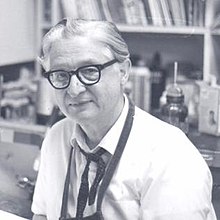Fred Wright (June 24, 1907 – December 29, 1984) was an American labor cartoonist and activist who created "thousands" of illustrated news strips as a staff cartoonist for the United Electrical, Radio and Machine Workers of America (UE).[1] His first published cartoon appeared in The Pilot, a publication owned by the National Maritime Union, in 1939. In 1949, the UE hired Wright as a staff cartoonist,[2] for whom he worked until his death on December 29, 1984.[1][3]
Fred Wright | |
|---|---|
 Fred Wright | |
| Born | June 24, 1907 Derby, England |
| Died | December 29, 1984 (aged 77) |
| Nationality | English |
| Occupation | cartoonist |
| Years active | 1939–1984 |
| Signature | |
 | |
Early life
editWright was born on June 24, 1907, in Derby, England. With his family, Wright immigrated to America during childhood.[4] Wright learned to draw from his grandfather, an amateur artist who worked as a striper in automobile factories. As a teenager, Wright played saxophone professionally in clip joints and resorts; in the late 1920s, Wright attended classes at the New York Art Students League (NYASL). According to Paul Buhle in Encyclopedia of the American Left, the Great Depression "truly radicalized" Wright. On ships, where he worked as a musician, Wright met National Maritime Union (NMU) organizers.[5]
Cartoonist
editWright's first published cartoon appeared in The Pilot, a publication owned by the NMU, in 1939.[6]
Artistically, Buhle stated Wright's work "heralded the abandonment of the symbolic proletarian muscular giant in favor of a more workaday Joe (or Jane) fighting back against inflation, automation, and employer attacks," while his "Art Young-type philosophical approach to the difficulties of modern existence transcended socialist and class clichés without ... losing ... basic points of unfairness and exploitation." In 1989, John Nichols of The Blade described Wright as the "father of modern labor cartooning".[7] Buhle categorized Wright as the second-most widely published labor cartoonist after Young.[5]
Later life
editWright died of cancer on December 29, 1984,[3] while in creation of a cartoon history on the Industrial Revolution.[5]
References
edit- ^ a b Sam Pizzigati; Fred J. Solowey, eds. (1992). The New Labor Press: Journalism for a Changing Union Movement. ILR Press. p. 140. ISBN 978-0-87546-189-2.
- ^ United Electrical, Radio & Machine Workers of America International Convention Proceedings. The Union. 1985. p. 126.
- ^ a b Apter, Jeff (1983). "In Fred's Own Wright". The Modern Unionist. 8–12. Percival Publishing Company.
- ^ In Memoriam: Fred Wright. United Electrical, Radio and Machine Workers of America. 1985. pp. 1–2.
- ^ a b c Buhle, Paul (1998). "Wright, Fred". In Buhle, Mari Jo; Buhle, Paul; Georgakas, Dan (eds.). Encyclopedia of the American Left (2nd ed.). Oxford University Press. p. 908. ISBN 978-0-19-512088-2.
- ^ Brodt, Zachary. "Fred Wright Papers Finding Aid". Archive Service Center, University of Pittsburgh. Retrieved April 1, 2013.
- ^ Nichols, John (September 3, 1989). "Cartoonist's Skills Promote Labor's Causes". The Blade. p. L-10.
Further reading
edit- "Drawing on the American Labor Movement: Labor History Cartoons of Fred Wright". University of Pittsburgh. Retrieved January 4, 2016. Digitized collection of Wright cartoons
- Wright, Norman. Fifty years of Fred Wright: Cartoons from the 1930s to the 1980s. OCLC 41260228. Collection of Wright cartoons